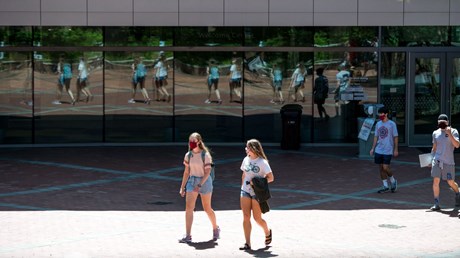As students report high levels of anxiety and isolation in a new InterVarsity survey, ministry leaders look to small groups to provide community for Gen Z.

Even as many colleges lift COVID-19 restrictions and anticipate more-active campus life in the fall, ministry leaders expect that pandemic will continue to shape how they gather and have lingering effects on students’ mental health and social lives.
A survey commissioned by InterVarsity Christian Fellowship and released today is the latest in a string of research indicating that college students suffered higher levels of stress and anxiety as their lives inside and outside the classroom grew more remote and isolated.
The ministry found that by the end of the school year in May 2021, over a year after the pandemic began, around half of InterVarsity students said their mental and emotional health had been negatively impacted. Of those, the majority said the biggest challenge contributing to their mental state was loneliness and isolation.
At the University of South Carolina, campus minister Lizzie Keegan saw the suffering firsthand, especially among freshmen students, who faced the challenge of making friends their first year of college in the midst of campus rules designed to keep students apart.
While doing Instagram outreach to connect with new students, Keegan noticed one freshman who admitted she hadn’t made friends at UofSC and was asking students to direct message her if they wanted to be her friend. “I thought if she’s willing to do that, how many more students feel like that but wouldn’t put themselves out there,” Keegan said.
The freshman ended up coming to InterVarsity gatherings once her schedule allowed mid-year. “She was like, ‘Oh my gosh. I can’t believe this is a room of people—yes, in masks—who want to be friends, who enjoy each other, who laugh ...
from Christianity Today Magazine
via


.gif)

.gif)
.gif)
